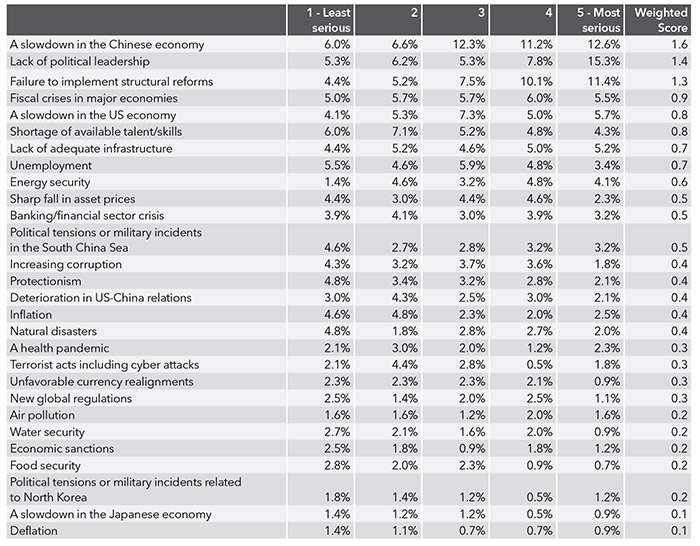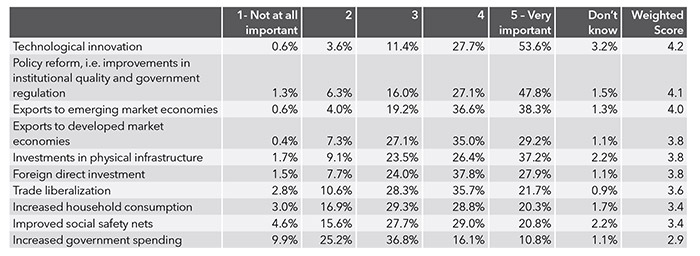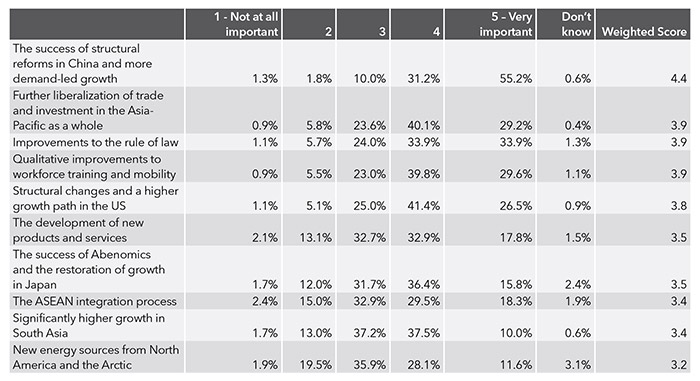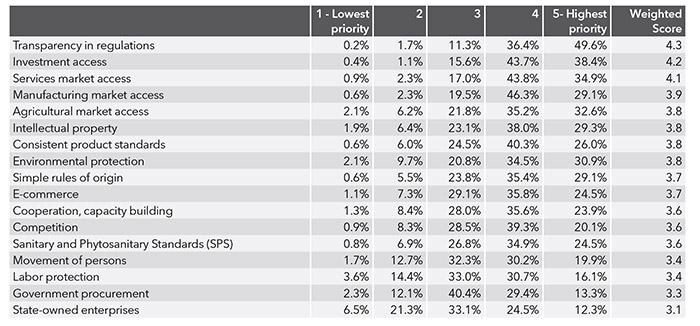ANNEX B - For Chapter 3: Perceptions of Growth and Integration in the Asia-Pacific
The results of this survey are based on an online or paper questionnaire conducted from 31 July to 5 September 2014. A total of 602 opinion-leaders from 25 Asia-Pacific economies, including all 21 APEC members responded to the survey.
The survey is disseminated through PECC member committees who are asked to identify panelists based on their knowledge of the Asia- Pacific region.
As this is a multi-stakeholder survey, the Council’s member committees are asked to identify stakeholders – from business, government and the non-government sectors. This year 27 percent of respondents were from the business sector, 20 percent from the government, and 53 percent from non-government (including analyst, civil society and the media).
This is not a survey of public opinion but rather, a survey of those whose views influence policymaking, especially at the regional level. As some of the questions tend to be technical, they require a relatively deep knowledge of developments at regional level. This is by no means a reflection of the general views of a population within any sub-region or even economy. However, we do believe that those surveyed include those who are responsible for influencing and often making decisions on various aspects of their economy’s positions within different regional groups.
The profiles of respondents are:
• Government
Panelists should be either decision-makers or senior advisors to decision-makers. As a guide, the government respondents in previous years included a number of former and current Ministers, Deputy and Vice-Ministers, Central Bank Governors and their advisors for Asia- Pacific issues, current APEC Senior Officials, and a number of former APEC Senior Officials.
• Business
Panelists should be from companies who have operations in a number of Asia-Pacific economies or conduct business with a number of partners from the region. This might include each economy’s current ABAC members as well as past ABAC members. In last year’s survey, these included CEOs, vice presidents for Asia-Pacific operations, and directors of chambers of commerce.
• Non-government: Research Community/Civil Society/Media
Panelists should be well-versed in Asia-Pacific affairs, being the type of people governments, businesses, and the media would tap into to provide input on issues related to Asia-Pacific cooperation. These included presidents of institutes concerned with Asia-Pacific issues, heads of departments, senior professors, and correspondents covering international affairs. In addition to our member committees, we would like to express our appreciation towards UN ESCAP and the Consumer Unity and Trust Society (CUTS International) from whom we have also received assistance to reach out to more respondents beyond our membership for participation in the survey.
Respondent Breakdown
We do not disaggregate results for each economy but rather by sub-regions – Northeast Asia, North America, Oceania, Pacific South America, and Southeast Asia.
- North America: Canada, Mexico, and the United States
- Northeast Asia: China, Hong Kong (China), Japan, Korea, Mongolia, Russia, and Chinese Taipei
- Oceania: Australia, New Zealand, and Papua New Guinea
- Pacific South America: Chile, Colombia, Ecuador, and Peru
- Southeast Asia: Brunei Darussalam, India, Indonesia, Malaysia, Philippines, Singapore, Thailand, and Vietnam

Economic Outlook and Risks to Growth
1. What are your expectations for economic growth over the next 12 months compared to the last year for the followingveconomies/regions?Please select/tick the appropriate box.

2. Please select the top five risks to growth for your economy over the next 2-3 years. Please select ONLY five (5) risks, using a scale of 1-5, please write 1 for the least serious risk and, 2 for the next most important risk and so on.

Future Growth and Consumption in the Asia-Pacific
3. In 2010 APEC leaders agreed that the quality of growth of the region needed to be improved so it will be more balanced, inclusive, sustainable, innovative, and secure. How satisfied are you with efforts so far on each dimension? Use a scale of 1-5, select: ‘1’ if you are not at all satisfied; ‘2’ if slightly satisfied; ‘3’ if moderately satisfied; ‘4’ if very satisfied; ‘5’ if extremely satisfied; or ‘don’t know’ if you are not sure or are not aware of actions taken to promote the APEC Growth Strategy

4. Please rank each of the following in order of how important you think they will be to the future growth of your economy over the next 5-10 years.Use a scale of 1-5, select: ‘1’ if you think the issue is not at all important; ‘2’ of little importance; ‘3’ moderately important; ‘4’ important, ‘5’ very important or ‘don’t know’ if you are not sure.

5. Please select the top 5 categories in which you think consumers in your economy are likely to spend an increasing share of their income on(select only 5)

6. How important do you think the following are for growth prospects in the Asia-Pacific region as a whole over the next 5-10 years?Use a scale of 1-5, select: ‘1’ if you think the issue not at all important; ‘2’ of little importance; ‘3’ moderately important; ‘4’ important, ‘5’ very important or ‘don’t know’ if you are not sure.

Regional Cooperation and Integration
7. Please indicate your agreement or disagreement with the following statements:

8. What do you think is the likelihood of success in concluding the following proposed agreements over the next 3 years?Use a scale of 1-5, select ‘1’ if you think it is not at all likely if the negotiations will be completed within the next 3 years; ‘2’ if not likely; ‘3’ if neither unlikely nor likely; ‘4’ if likely, ‘5’ if very likely or ‘don’t know’ if you are not sure.

9. Please rate each of the following in terms of the need for them to be addressed in Asia-Pacific free trade agreements?

10. What do you think should be the top 5 priorities for APEC Leaders to address at their upcoming meeting in Beijing?Please select ONLY five (5) issues, using a scale of 1-5, please write 1 for the issue you think is most important, 2 for the next most important issue and so on.
